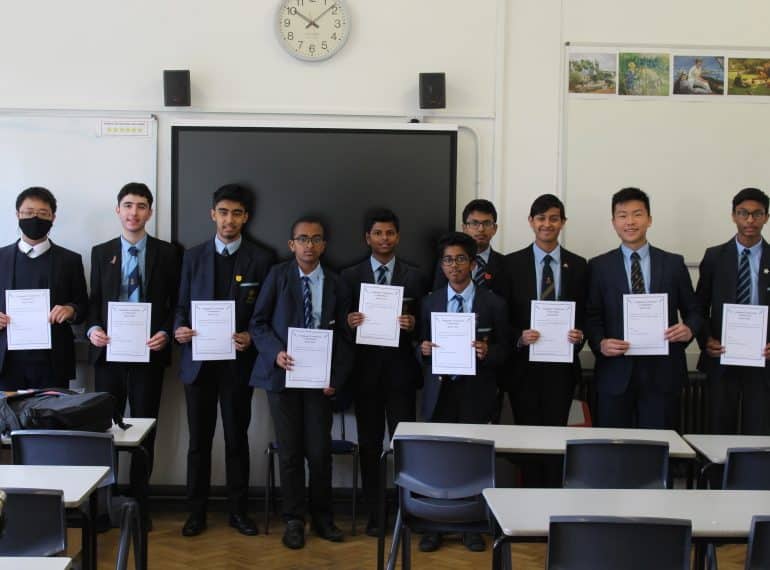
QE linguists have won national and regional honours in a literary translation competition run from The Queen’s College, Oxford, that attracted thousands of entries nationwide.
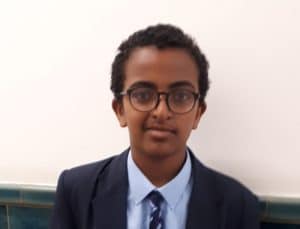 Year 7 pupil Jonas Dawit took second prize nationally for French in his age group, while Year 11’s Arjun Patel was the winner for Greater London for German. Olly Salter, of Year 12, also won a regional commendation, again for German.
Year 7 pupil Jonas Dawit took second prize nationally for French in his age group, while Year 11’s Arjun Patel was the winner for Greater London for German. Olly Salter, of Year 12, also won a regional commendation, again for German.
All the QE boys who entered the Anthea Bell Competition were given a one-off lesson about literary translation from German or French into English, using resources provided by the competition organisers.
Languages teacher Katrin Hood said: “I congratulate everyone who entered, and of course our winners, who did brilliantly to be recognised amongst such fierce competition!”
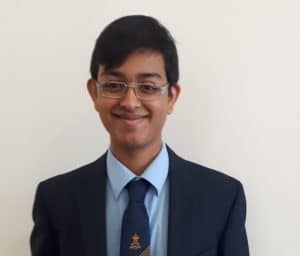 It was the second consecutive year that QE has entered the competition, which is named after an acclaimed English literary translator who died in 2018.
It was the second consecutive year that QE has entered the competition, which is named after an acclaimed English literary translator who died in 2018.
“It has once again been a pleasure to discuss literary translations in class, and to hear our students’ fantastic and creative solutions to the particular challenges each text presents,” said Ms Hood.
The competition is run by The Queen’s College Translation Exchange – an initiative which seeks to bring together university students, school pupils, teachers and members of the public – and involves young linguists submitting their own translations of a specified piece of writing.
An internal round at the School is held first: open to all boys, it this year attracted 73 entrants, representing an increase on the 2021 figure.
From these entrants, judges from across the Languages department picked the best French and best German translator for each age group. They also identified the five from each group whom the School was allowed to enter into the national competition.
Nationwide, 14,000 secondary school pupils undertook the translation task, with more than 3,200 then going through to the national competition, which was judged by a team comprising both Queen’s College undergraduates and professional translators.
National runner-up Jonas had to translate the surrealist poet Robert Desnos’s poem, Le Crapaud, (The Toad). Its first stanza is:
Sur les bords de la Marne
Un crapaud il y a
Qui pleure à chaudes larmes
Sous un acacia.
Jonas translated this as :
A toad all warty
On the banks of the Marne
Weeps hot tears
Under a thorn.
“He has chosen to maintain the rhyme scheme of the original, but in doing so has had to change the meaning of some of the original words. These decisions are central to the translator’s craft,” said Ms Hood.
“The competition gave us an opportunity to go beyond what we normally do in the classroom and allowed the boys to be introduced to a wide range of literary texts that they otherwise might not have come across.”
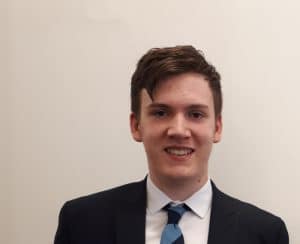 After learning of his commendation, Olly reflected on the experience: “’Entering the Anthea Bell translation competition was immensely rewarding. The need to think outside of the box – to ensure not only the meaning, but also the tone, of the text was preserved – was exciting and something I will carry with me into my future study of languages and translation. I am so glad that I took part.”
After learning of his commendation, Olly reflected on the experience: “’Entering the Anthea Bell translation competition was immensely rewarding. The need to think outside of the box – to ensure not only the meaning, but also the tone, of the text was preserved – was exciting and something I will carry with me into my future study of languages and translation. I am so glad that I took part.”
The year group winners in the internal QE competition, most of whom are pictured, top, were as follows.
French:
Year 7 – Jonas Dawit
Year 8 – Nimesh Nirojan
Year 9 – Binaga Solangaarachchi
Year 11 – Darren Lee
Sixth Form – Theo Mama-Kahn
German:
Year 7 – Stephan Tinss
Year 8 – Hardik Ingale
Year 9 – Keon Robert
Year 10 – Avkash Lahkar
Year 11 – Arjun Patel
Sixth Form – Alan Yee Kin Yan

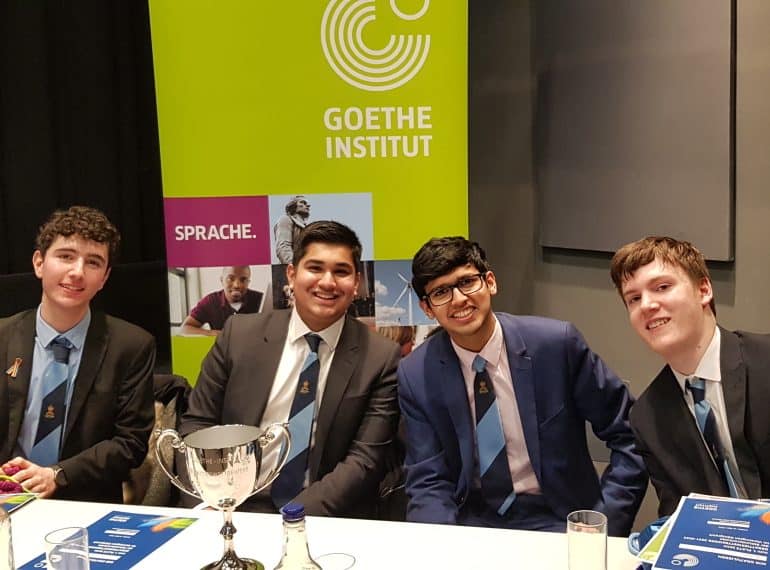
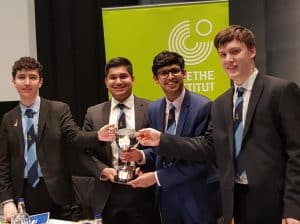 The four-strong team from QE impressed in three earlier rounds, before eventually taking the title in the final, overcoming a team drawn from the near-4,000 students at The Sixth Form College, Farnborough.
The four-strong team from QE impressed in three earlier rounds, before eventually taking the title in the final, overcoming a team drawn from the near-4,000 students at The Sixth Form College, Farnborough.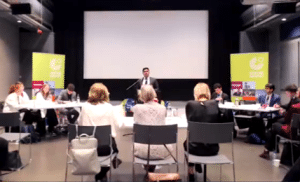 Round 1: School canteens should only be allowed to sell vegetarian/vegan food. QE, in favour of the motion, beat Coloma Convent Girls’ School in south London.
Round 1: School canteens should only be allowed to sell vegetarian/vegan food. QE, in favour of the motion, beat Coloma Convent Girls’ School in south London.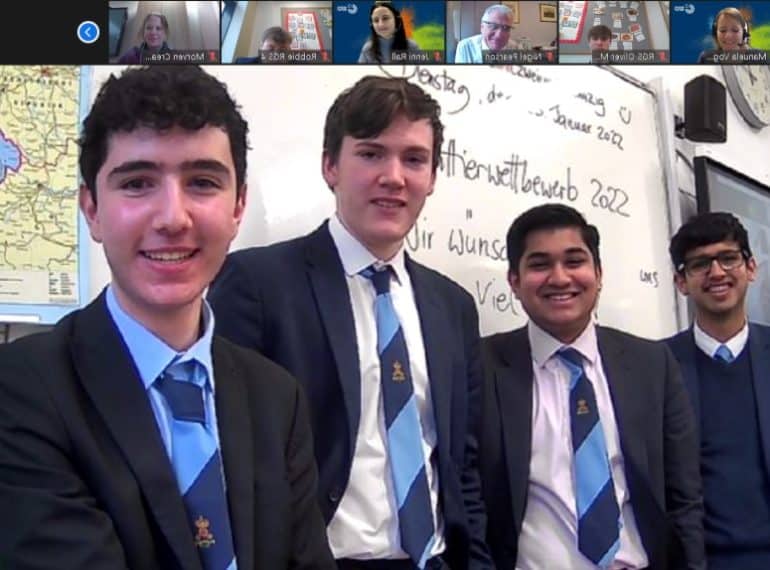
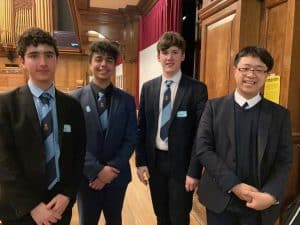 Still basking in their success, current School Captain Theo and classmate Olly were then joined by fellow Year 12 pupils Alan Yee Kin Kan and Antony Yassa for the French debating competition, which was held at St Paul’s Girls’ School.
Still basking in their success, current School Captain Theo and classmate Olly were then joined by fellow Year 12 pupils Alan Yee Kin Kan and Antony Yassa for the French debating competition, which was held at St Paul’s Girls’ School.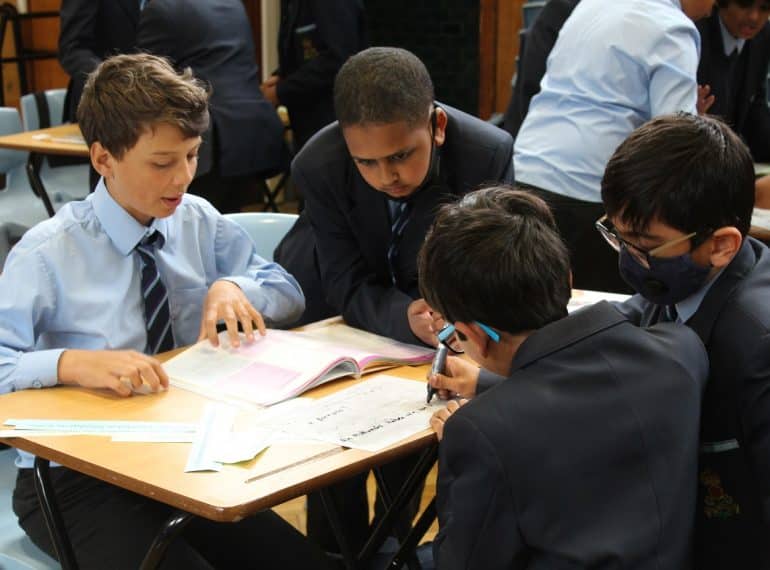
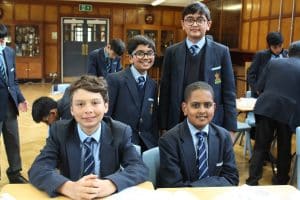 Each Year 7 form put forward a team made up of three or four boys. First place went to Pearce, with team members Ameen Elamin, Kyle Goldband, Tuhin Mitra and Nittant Moudgil scoring an emphatic victory.
Each Year 7 form put forward a team made up of three or four boys. First place went to Pearce, with team members Ameen Elamin, Kyle Goldband, Tuhin Mitra and Nittant Moudgil scoring an emphatic victory.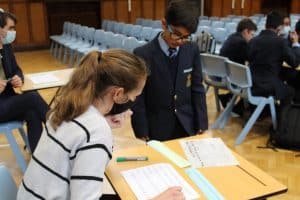 “They were allowed to use their text books to help, as the ‘vocab’ we used was taken from the Year 7 course, but the sentences were pitched to be extra-challenging, particularly in terms of grammatical structures.”
“They were allowed to use their text books to help, as the ‘vocab’ we used was taken from the Year 7 course, but the sentences were pitched to be extra-challenging, particularly in terms of grammatical structures.”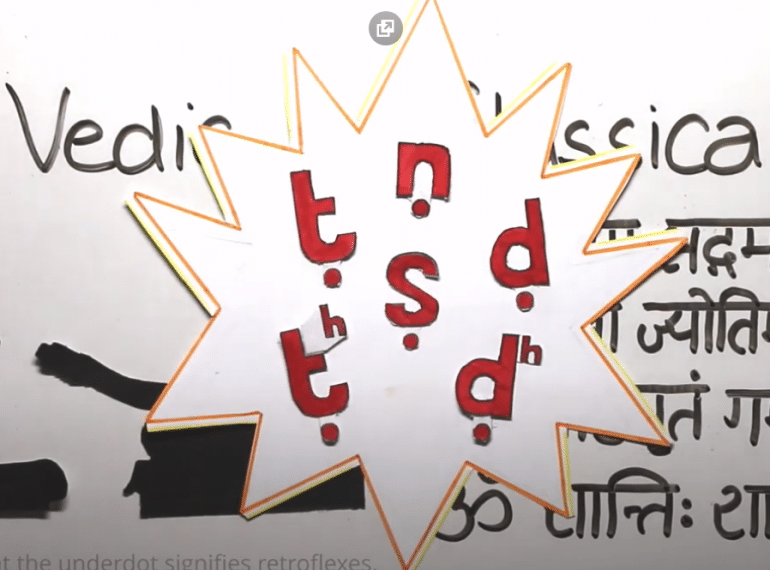
 The collective – a collaborative blog written and produced by Cambridge University linguists – awarded Vineeth joint first prize in the senior individual category for his closely argued seven-minute
The collective – a collaborative blog written and produced by Cambridge University linguists – awarded Vineeth joint first prize in the senior individual category for his closely argued seven-minute  Vineeth explored the various academic theories about the origins of these sounds and how they developed. He looked at why retroflexes are common across hundreds of different languages throughout the Indian sub-continent, yet are relatively rare in other parts of the world.
Vineeth explored the various academic theories about the origins of these sounds and how they developed. He looked at why retroflexes are common across hundreds of different languages throughout the Indian sub-continent, yet are relatively rare in other parts of the world. Vineesh concluded: “This is what is amazing about retroflexes: the profound impact that they have on the complex sociology of south Asia, spreading across the tongues of people from a diversity of cultures, religions and backgrounds in a way that nothing else possibly could….Retroflexes seem to bind all of south Asia together. Despite making us seem homogenous and often risible to the western world, [their] history can give us a glimpse into the complex interactions between diverse cultures thousands of years ago.”
Vineesh concluded: “This is what is amazing about retroflexes: the profound impact that they have on the complex sociology of south Asia, spreading across the tongues of people from a diversity of cultures, religions and backgrounds in a way that nothing else possibly could….Retroflexes seem to bind all of south Asia together. Despite making us seem homogenous and often risible to the western world, [their] history can give us a glimpse into the complex interactions between diverse cultures thousands of years ago.”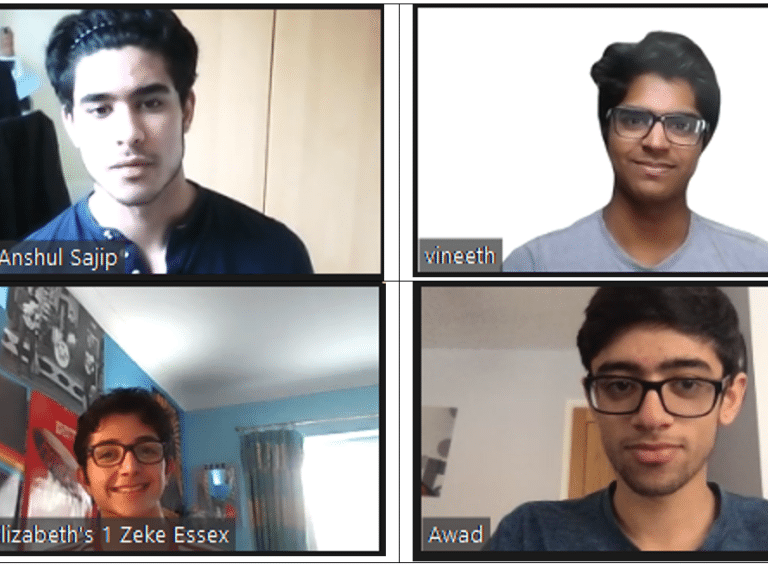
 QE’s Head of Languages, Nora Schlatte, was a member of the jury, and saw Vineeth and Awad in action. “Their research, poise and accuracy of language were amazing,” she said “Vineeth’s opening speech was described as ‘un modèle du genre’ [a model of its kind] and both boys responded very well to some challenging questions. Participating in something like this, especially remotely, is really daunting and they did brilliantly.”
QE’s Head of Languages, Nora Schlatte, was a member of the jury, and saw Vineeth and Awad in action. “Their research, poise and accuracy of language were amazing,” she said “Vineeth’s opening speech was described as ‘un modèle du genre’ [a model of its kind] and both boys responded very well to some challenging questions. Participating in something like this, especially remotely, is really daunting and they did brilliantly.”